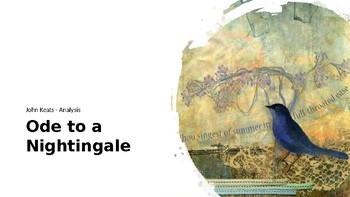

The nightingale, after all, is “immortal” because it “wast not born for death” and cannot conceive of its own passing. First the intoxication of wine and later the “viewless wings of Poesy” seem reliable ways of escaping the confines of the “dull brain,” but finally it is death itself that seems the only possible means of overcoming the knowledge and fear of time. In the ode, the speaker responds to the beauty of the nightingale’s song with a both “happiness” and “ache.” Though he seeks to fully identify with the bird-to “fade away into the forest dim”-he knows that his own human consciousness separates him from nature and precludes the kind of deathless happiness the nightingale enjoys.

On inquiry, I found those scraps, four or five in number, contained his poetic feeling on the song of our nightingale. When he came into the house, I perceived he had some scraps of paper in his hand, and these he was quietly thrusting behind the books. Keats felt a tranquil and continual joy in her song and one morning he took his chair from the breakfast table to the grass plot under a plum tree, where he sat for two or three hours. … A nightingale had built her nest near my house. Brown later wrote the following account, which may offer the reader insight about the experience expressed in “Ode to a Nightingale”: In the spring of 1819, the months during which Keats wrote four of the five great odes, Keats stayed with his friend Charles Brown in Wentworth Place, Hampstead.


 0 kommentar(er)
0 kommentar(er)
